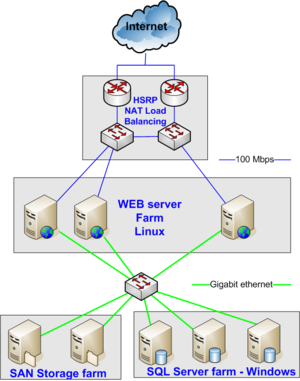Difference between revisions of "Cluster shared storage"
From Teknologisk videncenter
m (→RedHat/Centos shared storage) |
m (→RedHat/Centos WEB servers) |
||
| Line 11: | Line 11: | ||
== RedHat/Centos WEB servers == | == RedHat/Centos WEB servers == | ||
The WEB servers all run Centos 5.2 and use the the FreeNAS servers for application data. | The WEB servers all run Centos 5.2 and use the the FreeNAS servers for application data. | ||
| + | *Make a cluster with membernodes. | ||
*On one system do the following | *On one system do the following | ||
*#Install [[iSCSI]] initiator software on the WEB-servers | *#Install [[iSCSI]] initiator software on the WEB-servers | ||
Revision as of 15:19, 31 March 2009
RedHat/Centos shared storage
Consider the drawing below. The WEB-servers run Centos 5.2 and share the redundant data from the shared storage.
- Each WEB server has access to the same data from the shared storage calles NAS - Network Attached Storage.
- The WEB-servers has Read/Write access to the NAS.
- Locking of files open for writing is necessary.
The shared Storage
Two servers with each two drives are installed with FreeNAS The drives are exported as iSCSI targets.
RedHat/Centos WEB servers
The WEB servers all run Centos 5.2 and use the the FreeNAS servers for application data.
- Make a cluster with membernodes.
- On one system do the following
- Install iSCSI initiator software on the WEB-servers
- Attach the logical drives to the system system
- Create a Volume Group
- Create a logical Volume
- Create a GFS filesystem
- Install iSCSI initiator software on the WEB-servers
- On all the Clusternodes
- Install iSCSI initiator software on the WEB-servers
- Attach the logical drives to the system system
- Make a mountppoint
- Mount the Logical Volume (GFS Filesystem)
- Install iSCSI initiator software on the WEB-servers
